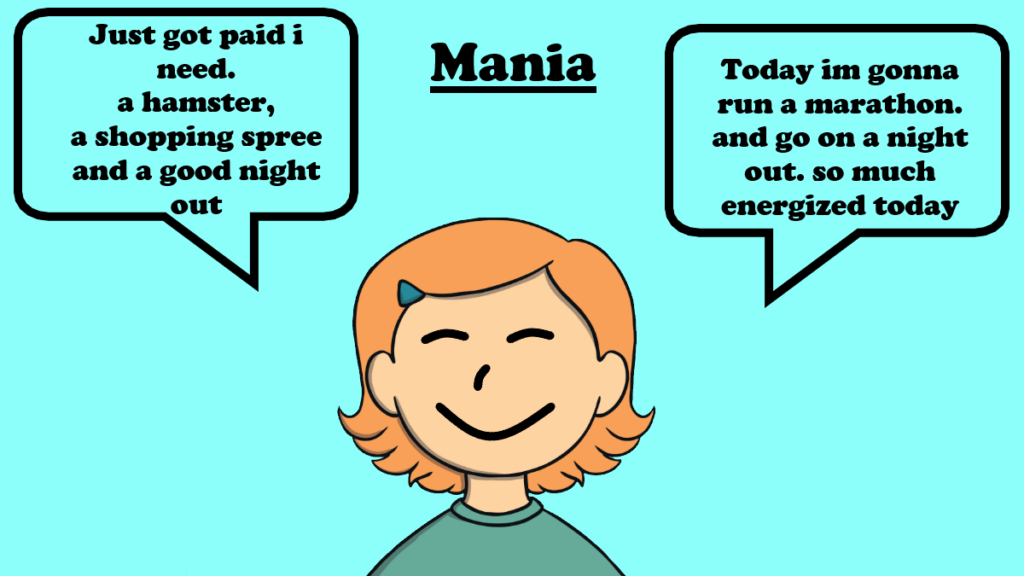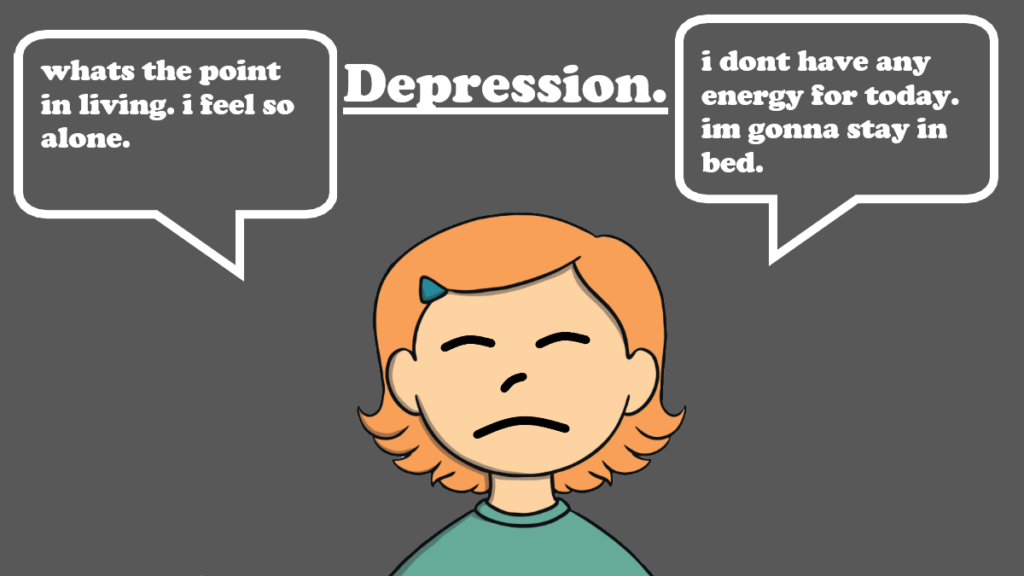Bipolar disorder is a mental health condition that is characterised by extreme shifts in mood. This occurs on a continuum with the experience of extreme lows referring to depression and extreme highs to mania.
A psychiatrist can diagnose you with one of two types of bipolar disorder:
Bipolar 1 – have at least one episode of mania that has lasted longer than a week, might have experienced a depressive one but not everyone will
Bipolar 2 – have experienced symptoms of both hypomania and severe depression
Cyclothymia – can be diagnosed with this if you have had both hypomanic and depressive mood states over two years or more. Also, if the symptoms are not severe enough to be diagnosed with bipolar disorder.
Symptoms
If someone is experiencing a depressive episode they may display the following symptoms:
- Feeling hopeless or sad
- Losing interest in daily activities or tasks
- Loss of appetite
- Problems sleeping
- Thoughts of suicide
- Thoughts of self-harm
- Feeling empty
The phase of mania may include the following symptoms:
- Feeling like you are full of energy
- Speaking faster than usual
- Feeling very happy
- Easily distracted
- Easily irritated
- Not feeling like you need to sleep
- Not eating
- Making impulsive or risky decisions
- Saying things that would be out of character

A hypomanic episode is similar to manic one but there are a few differences that separate them:
- Symptoms feel manageable which means you might not have any problems socialising or going to work
- Duration of the episodes are shorter
- No psychotic symptoms
The duration of these manic and depressive episodes can sometimes last several weeks or months. The experience of these episodes is also dependant on the individual as one person may have more regular episodes of mania than depression and for someone else it could be the reverse. This also goes for the patterns in their symptoms:
- A rapid cycle where there is a repeated shift from a high to a low phase, this happens without there being a ‘normal’ period in between
- A mixed state, this is where a person will have symptoms of both mania and depression together
But this does not mean that these extreme shifts in mood are permanent as some people will have periods where they are in a normal mood.
Causes
As with many mental health conditions the exact cause of bipolar disorder is not known. However, it is believed that there are several factors that interact to increase the chances of someone developing bipolar disorder.
Genetics
If a person has a family member that has been diagnosed with bipolar disorder it increases the chance that they may develop the condition themselves.
Chemicals in the brain
The functions of the brain are controlled by chemicals called neurotransmitters. These include dopamine, serotonin and noradrenaline. It is believed that if there is an imbalance of these chemicals in the brain a person may develop symptoms of bipolar disorder. As an example, if noradrenaline levels are high there is an increased chance in the development of manic episodes. But if these levels are low, they can lead to depressive episodes.
Triggers
For a person who may be at risk of developing bipolar disorder the occurrence of stressful or life-changing events can trigger its symptoms. These events can include:
- Emotional, sexual or physical abuse
- Death of a loved one or family member
- Problems in your life that become overwhelming such as financial worries, relationship problems or work problems
Diagnosis
In order to get diagnosed with bipolar disorder you must first be referred to a psychiatrist by your GP. At this appointment you will assessed on the symptoms you have been experiencing as well as their duration. They will also require information on family history and your own medical background. In addition to this, you may need to have some tests done to rule out the possibility that these symptoms may be due to a physical problem with your thyroid. A diagnosis can take time as the specialist may choose to observe you for a period of time. This is because some of the symptoms of bipolar disorder are common in other mental health conditions such as borderline personality disorder, schizophrenia, schizoaffective disorder and depression.
Treatment
The treatment of bipolar disorder is through a combination of medication and talking therapy. The specific treatment programme that is set out will be designed on the basis of what episodes are being experienced.
Talking therapy such as Cognitive behavioural therapy (CBT) works by helping someone to recognise and address any negative thoughts they are having. There would also be tips on how to change any unwanted patterns of behaviours that could be damaging. In addition to this, education can be vital as it allows you to learn everything you need to about the condition. It will also allow you to make sense of the diagnosis. The information that you receive from these meetings can help identify warning signs and symptoms and manage them more effectively. The mood swings that you have had may have affected some of your relationships. A therapist will help by giving you some advice on how to mend these fences.
Medications, referred to as mood stabilisers, are prescribed to help prevent a person experience episodes of mania and depression. The most common medicine that is used to treat bipolar disorder is called lithium. As part of the treatment process there will need to be regular checks to make sure that lithium levels are where they should be and that it has had no impact on kidney and thyroid functions. Also, if you begin to feel any side-effects it is important to contact your GP as soon as possible. This is so that they can change or adjust the medication.
Living with Bipolar disorder
Bipolar disorder is a long-term condition but with the right treatment and using some self-help techniques the symptoms can be better managed.
Mood monitoring
You can find a mood diary and app on the Bipolar UK website to monitor your mood. The importance of this is that over time it will allow you to be able to track your moods and be able to spot any patterns that will help in the treatment process.
Get enough sleep
This can be both a symptom and trigger of bipolar disorder. By making sure that you get enough sleep it can help to stabilise your mood. This will allow you to be able to go about your life like normal.
Exercise
Exercise can be a perfect outlet for someone with bipolar disorder. This is because during the extreme highs it will allow you to use up some of the energy that you have. In the case of the extreme lows, doing some exercise will release endorphins, a feel good chemical, in the brain that will help to improve your mood.

Support
It is important to remember that no matter what situation you are in there is support out there for you. If you do not find it easy talking to friends or family about your condition it can be easier to speak to support groups or charities. This includes Bipolar UK eCommunity, which is an online forum where you are in a safe space to talk about any challenges you may be facing, ask any questions and share any experiences with others.



